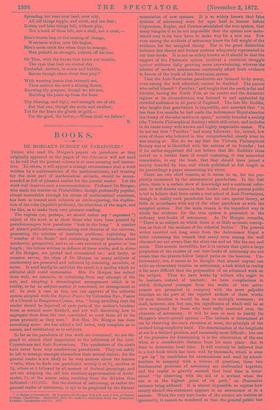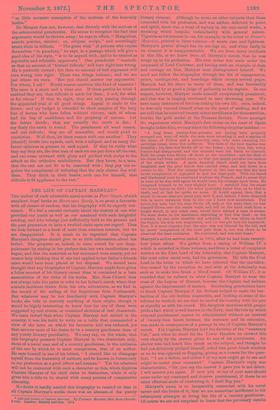BOOKS.
DE MORGAN'S BUDGET OF PARADOXES.* 'Tam who read Be Morgan's papers on paradoxes as they originally appeared in the pages of the Athenzum will not need to be told that the present volume is at once amusing and instruc- tive. To others, it will appear a strange circumstance that a work written by a mathematician of the mathematicians, and treating for the most part of mathematical subjects, should be recom- mended as full of pleasant matter for the general reader. Yet the work well deserves such a recommendation. Professor Be Morgan, who made his treatise on Probabilities, though professedly popular, almost unreadable through his excess of mathematical exactness, has here so treated such subjects as circle-squaring, the duplica- tion of the cube (Apollo's problem), the trisection of the angle, and the like, as to make them very pleasant reading.
The express (or, perhaps, we should rather say "expressed ") -object of the work is to show those who have been pureed by paradoxmongers how paradoxes "look in the lump." A number of absurd publications—enunciating new theories of the universe, presenting the solution of insoluble problems, explaining the "number of the Beast," and containing strange blunders about mechanics, perspective, and so on—are reviewed at greater or less 'length ; the letters written in defence of these works, and in abuse -of Be Morgan, are quoted and commented on ; and lastly, as -occasion serves, the ideas of De Morgan on many subjects of controversy are presented and enforced by reasoning, anecdote, or satire. It need hardly be said that the result is a medley which no -editorial skill could systematise. Mrs. De Morgan has indeed done well, we conceive, in refraining from any attempt of the sort, and adopting a chronological arrangement which is in reality, so far as subject-matter is concerned, no arrangement at all. In such a case as this, one can approve of the editorial system adopted with the Biglow Papers by Columbus Nye, Pastor of a Church in Bungtown Corner, who, "being unwilling that the reader should be deprived of such parts of the author's lucubra- tione as seemed more finished, and not well discerning how to segregate them from the rest, concluded to send them all to the press precisely as they were." But Mrs. Be Morgan has done something more : she has added a full index, very complete as to names, and satisfactory as to subjects.
So far as the paradoxes of this work are concerned, we are dis- posed to attach chief importance to the refutation of the Anti- -Copernicans and Anti-Newtonians. The quadrators of the circle have never been very mischievous paradoxists. They can safely be left to arrange amongst themselves their several claims ; for the general reader is not likely to be very anxious about the famous w-ratio, when he finds one paradoxist setting it at 3, another at Si, others at 3 followed by all manner of decimal groupings, and not one adopting the old but excellent approximation of Archi- medes, 34-, or the nearer value resulting from the division thus indicated-113)355. But the sttident of astronomy, or rather the general reader of astronomy, is apt to be perplexed by the blatant
A Budget of Paradoxes. By Augusto!' De Morgan, F.R.A.S. and C.P.S, of Trinity College, Cambridge. Reprinted, with the Author's additions, from the Athesueum. London: Longmans and Co. 1872.
enunciation of new systems. It is so widely known that false systems of astronomy were for ages held in honour before Copernicus, Kepler, and Newton established the true system, that many imagine it to be not impossible that the system now main- tained may in its turn have to make way for a new one. Few even among the students of astronomy know the fall weight of the evidence for the accepted theory. Nor is the great distinction between this theory and former systems adequately represented in our text-books. It is not as widely known as it should be that the support of the Ptolemaic system involved a continual struggle against evidence daily growing more overwhelming, whereas the labours of modern astronomers continually afford fresh evidence in favour of the truth of the Newtonian system.
That the Anti-Newtonian paradoxists are listened to by many, even among the well educated, cannot be doubted. The person who called himself "Parallax," and taught that the earth is flat and circular, having the North Pole at its centre and the Antarctic regions at its circumference, was listened to and applauded by crowded audiences in all parts of England. The late Mr. Iteddie, who taught that gravitation is impossible, and asserted that "in less than five months he had made the Astronomer Royal abandon the theory of the solar motion in space," actually founded a society (the Victoria Philosophical Society) which still exists, and includes in its ranks many well-known and highly respectable names. We do not say that "Parallax" had many followers ; for, indeed, few even of those who believed in him comprehended clearly what he was aiming at. Nor do we say that the Victoria Philosophical Society was or is identified with the notions of its founder ; but if its earlier supporters did not believe that Mr. Reddie's ideas rested on a certain basis of sound reasoning, it was somewhat remarkable, to say the least, that they should have joined a society founded by him, and which published at full length in its proceedings a paper enunciating his views.
There are two chief reasons, as it seems to us, for the per- plexity occasioned by the astronomical paradoxists. In the first place, there is a certain show of knowledge and a continual refer- ence to well-known names in their books ; and the general public is led to believe that there exists a real school of Anti-Newtonians, though in reality each paradoxist has his own special theory, as little in accordance with any of the other paradoxes as with the accepted system. But the main reason is the imperfect way in which the evidence for the true system is presented in the ordinary text-books of astronomy. As Be Morgan remarks, "There is no subject on which there is so little accurate concep- tion as that of the motions of the celestial bodies." The present writer received not long since from the Astronomer Royal a letter containing the remark that many even among the well educated are not aware that the stars rise and set like the sun and moon. This sounds incredible, but it is certain that quite a large proportion of the readers of our text-books of astronomy are not aware that the planets follow looped paths on the heavens. Un- fortunately, too, it seems to be thought that almost anyone can write an elementary treatise on astronomy, a task which in reality is far more difficult than the preparation of an advanced work on the subject. Thus we have works by writers who ought to be learners, instead of teachers ; we have compilations in which disfigured passages from the works of true astro- nomers are presented in company with the most palpable blunders on the part of the reputed authors of these works. Of such blunders it would be easy to multiply instances ; we shall, however, cite but one, the significance of which will be at once recognised by those who have really mastered even the elements of astronomy. It will be seen at once to justify De Morgan's above-quoted opinion :—The latitude is determined at sea by observing the sun's elevation at noon, the principle of the method being simplicity itself. The determination of the longitude at sea is a distinct problem, and immensely more difficult; but one of the processes for determining it is the observation of the sun when at a considerable distance from his noon place : this is done to determine local time. It will scarcely be believed that in a text-book which has been sold by thousands, which is even "got up" by candidates for examinations and used by school- teachers in company with a volume of questions, these two fundamental problems of astronomy are confounded together, and the reader is gravely assured that local time is deter- mined "by observing with the aid of a sextant when the sun is at the highest point of its path," an illustrative instance being adduced. It is almost impossible to express how utterly absurd this statement appears to an astronomer or to a seaman. When the very text-books of the science are written so ignorantly, it cannot be wondered at that the general public has "so little accurate conception of the motions of the heavenly bodies."
De Morgan does not, however, deal directly with the notions of the astronomical paradoxists. He seems to recognise the fact that arguments would be thrown away ; he says in effect, "Margaritas, munde porcine, calcilsti ; en, siliquas accipe," and accordingly treats them to ridicule. "The great wish" of persons who expose themselves "in paradoxy," he says, in a passage which will give a good idea of his style, "is to be argued with, and to be treated as reputable and refutable opponents." One paradoxist "reminds. us that no amount of blatant ridicule' will turn right into wrong He is perfectly correct ; but then no amount of bad argument will turn wrong into right. These two things balance ; and we are just where we were. Bat you should answer our arguments.' For whom, I ask? Would reason convince this kind of reasoner ? The issue is a short and a clear one. If these parties be what I contend they are, then ridicule is made for them ; if not, for what or for whom? If they be right, they are only passing through the appointed trial of all good things. Appeal is made to the future : and my budget is intended to show samples of the long line of heroes who have fallen without victory, each of whom had his day of confidence and his prophecy of success. Let the future decide ; they say roundly the earth is flat ; I say flatly the earth is round. The paradoxers all want reason, and not ridicule ; they are all accessible, and would yield to conviction. Well then, let them reason with one another ! They [should] divide into squads, each with a subject, and as many dif- ferent opinions as persons in each squad. If they be really what they say they are, the true man of each set can put down all the rest, and can come crowned with glory and girdled with scalps to the attack on the orthodox misbelievers. But they know, to a man, that the rest are not fit to be reasoned with ; they pay the re- gulars the compliment of believing that the only chance lies with them. They think in their hearts, each one for himself, that ridicule is fit appliance to the rest."



































 Previous page
Previous page